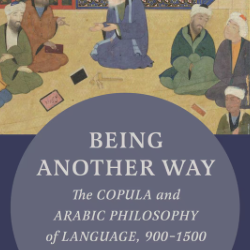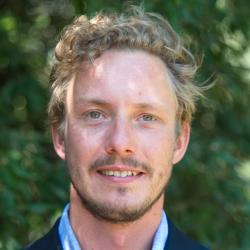I am a British Academy International Fellow working on Graeco-Arabic philosophy and postclassical Islamic intellectual history.
Biography
2024-2027
University of Cambridge, Faculty of Divinity
British Academy International Fellow
2023-2024
I Tatti, The Harvard University Center for Italian Renaissance Studies, Florence
Andrew W. Mellon Fellow
2021-2023
Ludwig-Maximilians-Universität München
Research Fellow at the DFG Project “Heirs of Avicenna”
Lehrstuhl VI für spätantike und arabische Philosophie
2015-2021
PhD, MA, Harvard University
PhD in Islamic Studies and Philosophy (Ad hoc joint degree)
MA in Near Eastern Languages and Civilizations
2013-2015
Diplôme, École Normale Supérieure Paris/Scuola Normale Superiore Pisa
Classics and Arabic (admission through Sélection Internationale)
2013-2015
MA, Université de la Sorbonne (Paris IV)
History of Philosophy
2009-2013
BA, University of Oxford
Classics and Oriental Studies
Research
My research interests are broadly in the history of Graeco-Arabic philosophy and in Islamic intellectual history, especially the so-called postclassical period from around 1200-1700 that remains heavily understudied.
About my first book, Being Another Way: The Copula and Arabic Philosophy of Language, 900-1500 (University of California Press 2024):
“In Being Another Way, Dustin Klinger recounts the history of how medieval Arabic philosophers in the Islamic East grappled with the logical role of the copula, “to be”—an ambiguity that has bedeviled Western philosophy from Parmenides to the analytic philosophers of today. Working from within a language that has no copula, a group of increasingly independent Arabic philosophers began to critically investigate the semantic role that Aristotle, for many centuries their philosophical authority, had invested in the copula as the basis of his logic. Drawing on extensive manuscript research, Klinger breaks through the thicket of unstudied philosophical works to demonstrate the creativity of postclassical Islamic scholarship as they explored the consequences of their intellectual break with the past. Against the still widespread view that intellectual ferment all but disappeared during the period, Klinger shows how these intellectuals over the centuries developed and refined a sophisticated philosophy of language that speaks to some core concerns of contemporary linguistics and philosophy.”
During my fellowship at I Tatti, I have been working on a book titled Renaissance Orientalisms: Arabic Philosophical Manuscripts in Humanist Circles, 1450-1650. As I was exploring the extraordinarily rich postclassical Arabic philosophical tradition, I began to wonder why premodern European scholars did not seem to have had any knowledge of that tradition, even though its main texts were available in the Mediterranean markets of, for example, Istanbul, Tunis, or Fez. And in fact, as my preliminary research has shown, there were manuscripts of such texts in Rome and Florence already in the Cinquecento. Hence, for this book project I study the material and intellectual histories connected to the circulation of those manuscripts on postclassical Islamic philosophy among Italian Renaissance humanists. The book will be an intervention in the history of Orientalism, as well as in Renaissance studies, showing how scholars across the Mediterranean – and sometimes far beyond – interacted with one another, as well as with the ideas and intellectual traditions of the perceived other.
My next book project as a British Academy International Fellow is titled Language and Meaning in Postclassical Islamic Intellectual History (1300-1500). My previous research has brought to light that in this period there was a remarkable turn to treating questions of what we would call “philosophy of language”. This was the case not only in the more strictly philosophical tradition that emerged from the Graeco-Arabic translation movement, but across many disciplines of the Islamic scientific canon. My book project for the fellowship will focus on the varieties of theoretical approaches to linguistic meaning across scientific disciplines in this period as a way of charting this “linguistic turn”, thereby showing the vitality of philosophical production through the period and making its pivotal texts and arguments available for further study.
Publications
Books
Klinger, Dustin. Being Another Way. The Copula and Arabic Philosophy of Language, 900-1500. University of California Press, forthcoming September 2024. https://www.ucpress.edu/books/being-another-way/paper
Klinger, Dustin (co-authored with Peter Adamson and Fedor Benevich). The Heirs of Avicenna: Philosophy in the Islamic East, 12-13th Centuries. Logic and Epistemology. Leiden: Brill, 2025.
https://brill.com/display/title/61391
Peer-reviewed articles
Klinger, Dustin. “Fakhr al-Dīn al-Rāzī’s (d. 1210) Contribution to Arabic Logic”, in T. Street & S. Zarepour (Eds.), Handbook for Arabic Logic and Philosophy of Language (Logic, Argumentation & Reasoning). Dordrecht, New York: Springer. Accepted, forthcoming 2026.
Klinger, Dustin. “A 6th/12th Century Arabic Attack on Peripatetic Logic: Rašīd ad-Dīn al-Waṭwāṭ’s Treatise ‘A Doubt About reductio ad absurdum’ and Its Aftermath”, In A. Ahmed, R. Strobino, & M. Zarepour (Eds.), Logic, Soul, and World: Studies in Honor of Tony Street. Leiden: Brill. Accepted, forthcoming 2025.
Klinger, Dustin. “The Analysis of Simple Categorical Statements Across Avicenna’s Main Works”, In A. Lammer (Ed.), Surveying the Summae: Proceedings of the Third Conference of the Avicenna Study Group. Leiden, Boston: Brill. Accepted, forthcoming 2025.
Klinger, Dustin. “’All Knowledge is either Conception or Assent’: On the History and Significance of a Fundamental Distinction in Islamic Philosophy”, British Journal for the History of Philosophy: 1-21 (2024). Online: https://doi.org/10.1080/09608788.2024.2400475
Klinger, Dustin. “Forms of Carroll’s Paradox in Post-classical Arabic Logic”, History and Philosophy of Logic 44 (2023): 1-16. https://doi.org/10.1080/01445340.2022.2162781
Klinger, Dustin. “Rereading Metaphysics E2-3: Aristotle’s Argument Against Determinism, and How Averroes Twisted It in His Long Commentary”, Arabic Sciences and Philosophy 32 (2022): 109-135. https://doi.org/10.1017/S0957423921000138
Teaching and Supervisions
At Harvard and in Munich, my teaching has focused on the history of Islamic philosophy, both of the medieval and the modern to contemporary periods. I have also taught Ancient Greek philosophy and Arabic language.
In Michaelmas 2024, I teach the Exercise "Argument and the Islamic Rational Sciences" in the Arabic Philosophy pathway.
I can supervise graduate students working in Graeco-Arabic studies, the history of Islamic philosophy, and the history of philosophy of language and logic. Please do get in touch!



